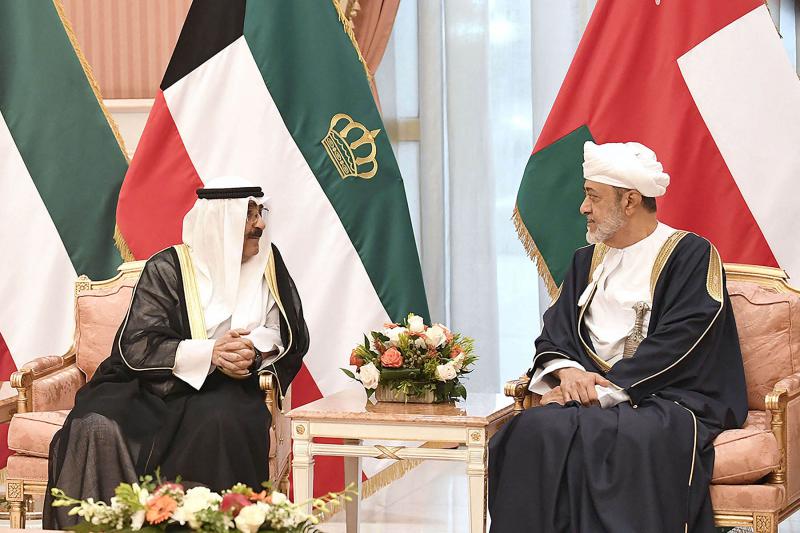KUWAIT CITY –
A visit by Oman’s Sultan Haitham bin Tariq to Kuwait on Monday came as an additional step towards strengthening relations between the two countries. These relations were earlier given a boost when the Kuwaiti Emir Sheikh Mishal Al-Ahmad visited Muscat last February, leading to the opening of the Duqm Refinery, which was completed in partnership between the two countries.
The visit of the Omani Sultan came after Kuwait formed a new cabinet headed by Sheikh Ahmad Abdullah Al-Sabah and the emir dissolved parliament indefinitely, after a prolonged period of bickering between the government and the elected parliament.
According to observers, the visit carries a message of support for the stability of Kuwait and shows that Oman, as well as other Gulf countries, are standing by the strict measures taken by the Kuwaiti emir to end the political squabbling and launch a reform process that would set the wheel of development in motion.
The Gulf states, all members of the Gulf Cooperation Council, are distinguished by a collective approach to the issue of stability, which explains the urgent support that Sheikh Mishal received via a phone call from the President of the UAE Sheikh Mohammed bin Zayed Al Nahyan, following the announcement of the new measures.
The two-day visit of the Omani Sultan is his first to Kuwait since he assumed power in January 2020.
In a meeting with the Kuwaiti emir, the two leaders discussed the long-standing relationship between their countries and explored avenues for enhancing cooperation in various sectors, the Kuwait News Agency reported.
They also addressed strategies for the advancement of the Gulf Cooperation Council, matters of shared interest and various regional and international affairs.
New agreements
Oman and Kuwait signed four memorandums of understanding (MoUs) aimed at enhancing cooperation across various sectors during the state visit.
These agreements span direct investment, metrology activities and diplomatic studies and training, besides a strategic MoU between Oman Investment Authority (OIA) and Kuwait Investment Authority (KIA).
The foreign ministries of both countries agreed to collaborate in the fields of diplomatic studies and training. This MoU is designed to foster cooperation, develop modern training methods for specialists in foreign policy, international relations and political science and facilitate exchange of documents, studies and experiences on topics of mutual interest.
Additionally, Oman’s ministry of commerce, industry and investment promotion (MoCIIP) signed two MoUs with its Kuwaiti counterparts. The first agreement with Kuwait Direct Investment Promotion Authority sets a framework for cooperation in direct investments, enhancing knowledge and experience exchange. The second agreement with Kuwait Public Authority for Industry is focused on standardisation, quality control and conformity assessment activities to enhance quality of non-food industrial products and services exchanged between the two nations.
OIA’s MoU with KIA outlines a framework for cooperation and coordination in joint investments, exploring future investment opportunities and the establishment of a joint investment fund focused on sectors such as energy, utilities, infrastructure, communications, transportation and logistics.
The Omani delegation, led by Abdulsalam Mohammed al Murshidi, President of OIA, and Qais Mohammed al-Yousef, Minister of Commerce, Industry and Investment Promotion, signed these agreements alongside Ibtisam Ahmed al-Farooji, Undersecretary for Investment Promotion in MoCIIP, and Saleh Amer al-Kharousi, Oman’s Ambassador to Kuwait.
The agreements mark a milestone in Oman-Kuwait relations, setting a foundation for enhanced cooperation and mutual growth aligning with both countries’ broader strategic interests in the region.
Oman-Kuwait Business and Investment Forum
On Monday, the Oman-Kuwait Business and Investment Forum, held at Kuwait Chamber of Commerce and Industry, discussed ways to enhance existing cooperation between the two countries in various fields.
Omani Minister of Commerce, Industry and Investment Promotion Qais Mohammed al-Yousef told the forum that Oman and Kuwait have shared commercial partnerships since old times.
He added that the visit of the sultan will help consolidate joint action, expand elements of economic integration to develop a vibrant economy that is capable of interacting with global economies and maintaining sustainability.
Yousef added that the two countries’ trade and investment cooperation in priority sectors would contribute to generating employment opportunities and promoting sustainable development in both countries.
“We hope that this forum will open up new vistas of cooperation and investment in the sectors of logistics, tourism, industry, food security and converting industries,” said Yousef, who stressed the importance of joining hands to achieve the goals of Oman Vision 2040 and Kuwait Vision 2035, notably in the sectors of trade, industry and investment.
He pointed out that the agreements and memorandums of understanding signed by the two countries would enable the private sector to realise further growth and sustainable development.
Kuwaiti Minister of Commerce and Industry Omar Saud Al Omar said that the forum would help activate strategic cooperation in the fields of trade and investment. He referred to what he described as “remarkable development in economic relations between the two countries over the past few years.”
He added that “the forum constitutes an important platform for exchanging visions, ideas and investment opportunities, as well as means to develop joint recommendations and build a better framework for exchanging trade and investments and overcoming challenges that might face Omani firms wishing to enter the Kuwaiti market.”
Kuwait hopes to benefit from the pioneering development experiences of other Gulf countries, which led to these countries achieving qualitative advances in various fields.
Due to its internal political circumstances and the sharp tensions that have characterised the political landscape over recent years between the legislative and executive authorities, Kuwait has not been able to launch the necessary reforms to resolve its many crises.


